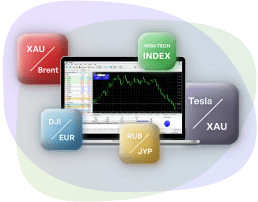- Education
- About Forex
- 10 Golden Rules for Successful Trading
10 Golden Rules for Successful Trading
It is not difficult to become a trader, but an easy start does not mean an easy profit. Trading is a kind of art. The success of a trader depends on many factors, starting from the choice of a broker, the size of the deposit and ending with the psychological attitude.
Below we present 10 everlasting rules for successful trading relevant to everyone, regardless of the market, trading strategy or time frames.
Each rule itself is very important, but the effect will be stronger if you follow all the rules together.
- 01Always use a trading plan - be disciplined At the initial stage of professional activity, a trader’s trading plan is the first personal document, which contributes to success.
- 02Stability is a sign of mastery Do not hurry to earn 100% every month. Learn to earn a little, but stable!
- 03Always use a Stop-Loss The usage of a stop-loss ensures that your losses and risks are limited.
- 04Control your thoughts and emotions If you are excited or just the contrary, depressed, close the terminal and have a rest. Never start trading in an excessively emotional state.
- 05Follow money management principles Do not risk more than 2% of your deposit per transaction. Proper risk management is the main principle for successful trading.
- 06Do not trade based on others' opinions Even the most experienced and authoritative advisor (a trader, an analyst, an insider) will not pay for your loss, because this is your deal, and you are the one to make a decision.
- 07Do not keep a losing deal for too long, especially without a stop-loss Such transactions can make your trading completely unpromising and quickly deplete your deposit.
- 08Leave hopes and prayers The market is always right. Think of trading as a business. Do not trade using your last or loan funds.
- 09Accept losses and learn from them The formula for success is to earn more on every winning deal than to lose on every losing deal.
- 10Enjoy your trading Try to feel and understand the market starting trading on a demo account, then, switching to a micro account and only after that to a standard real account.




